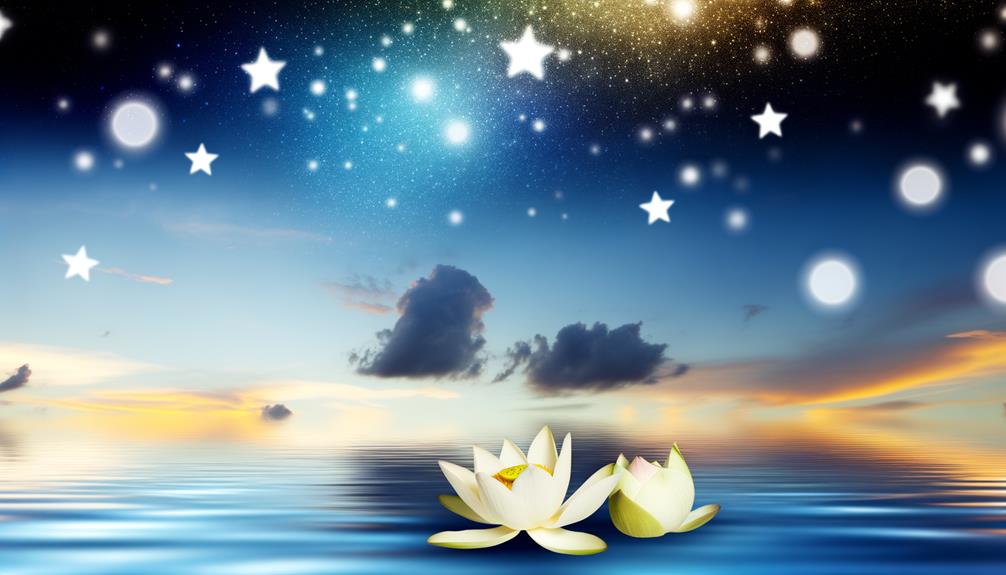Meaning of the Name Leela
The name 'Leela' originates from the Sanskrit language, carrying profound significance in Hindu mythology. It translates to divine play or cosmic drama, encapsulating the spontaneous and joyful essence of the deities' actions, particularly Krishna and Vishnu.
Mentioned in sacred texts like the Bhagavad Gita, Leela signifies the playful acts that sustain cosmic order. Its cultural and spiritual richness extends beyond ancient scriptures, influencing literature and popular media.
This name embodies a unique blend of tradition and contemporary appeal, making it both historically meaningful and resonant in modern times. Understanding its depth further reveals its multifaceted significance.

Key Takeaways
- The name 'Leela' means divine play or cosmic drama in Sanskrit.
- It is deeply rooted in Hindu mythology and signifies the playful actions of deities.
- The concept represents grace, spontaneity, and joy in life.
- Leela embodies the existential dance and cosmic order maintained by divine acts.
- It symbolizes interconnectedness and encourages reflection on the divine narrative of existence.
Origins and Etymology
The name Leela originates from the Sanskrit language and is deeply rooted in Hindu mythology, where it signifies divine play or cosmic drama.
The term 'Leela' (लीला) is derived from the Sanskrit root 'li' (ली), which means to play or engage in sport.
Historically, the concept of Leela has been employed in various Hindu scriptures, including the Puranas and the Bhagavad Gita, to describe the playful, effortless actions of the divine.
This notion emphasizes the idea that the universe and its myriad phenomena are manifestations of a supreme, playful consciousness.
Linguistically, Leela encapsulates a dual sense of playfulness and profound cosmic orchestration, making it a term of deep philosophical and theological significance in the Sanskrit lexicon.
Cultural Significance
The cultural significance of the name Leela is deeply embedded in Hindu mythology, where it is often associated with divine play and cosmic activities of deities like Krishna.
This spiritual interpretation extends to modern contexts, imbuing the name with connotations of grace, spontaneity, and transcendental joy.
Additionally, its prevalence in media and popular culture has further cemented Leela's status as a name that bridges ancient tradition with contemporary resonance.
Hindu Mythological Roots
Rooted deeply in Hindu mythology, the name 'Leela' encapsulates a concept that signifies divine play and the cosmic dance of the universe. This term is intricately associated with the Hindu deities Krishna and Vishnu, who utilize 'Leela' to maintain cosmic order through their playful, divine acts. The following table provides a detailed breakdown of its mythological associations:
| Aspect | Description |
|---|---|
| Origin | Sanskrit |
| Deities | Krishna, Vishnu |
| Mythological Significance | Divine play, universal balance |
| Cultural Texts | Bhagavad Gita, Mahabharata, Vishnu Purana |
This rich cultural context portrays 'Leela' as more than a mere name; it embodies a philosophical understanding central to Hindu thought, where the universe is seen as a playground for divine interaction.
Spiritual Interpretations
In various spiritual traditions and cultural contexts, 'Leela' transcends its mythological roots to embody a profound philosophical concept that underscores the inherent playfulness and spontaneity of the divine in shaping the universe. This term, rooted in Sanskrit, reflects the dynamic, often paradoxical nature of existence as perceived in Hinduism and other Eastern philosophies.
Key elements include:
- Divine Playfulness: The universe as a manifestation of divine joy.
- Existential Dance: Life and creation seen as an ongoing, fluid process.
- Spontaneity: Emphasis on the unplanned and natural progression of events.
- Cosmic Drama: Viewing human experiences as part of a larger, divine narrative.
- Philosophical Depth: Encourages reflection on the interconnectedness of all life.
These interpretations offer a rich, multifaceted understanding of existence.
Popularity in Media
Reflecting its profound spiritual roots, the name 'Leela' has permeated various forms of media, becoming a symbol of cultural resonance and artistic inspiration.
Historically, 'Leela' has appeared in literature, cinema, and television, often embodying the concept of divine play or cosmic drama. For instance, in the domain of animation, 'Leela' is famously represented by the character Turanga Leela in the acclaimed series 'Futurama,' symbolizing strength and complexity.
Additionally, Indian cinema has frequently utilized the name, such as in the film 'Leela' (2002), exploring themes of identity and self-discovery. This consistent presence underscores 'Leela's' versatility and enduring appeal, illustrating how a name deeply rooted in spirituality continues to inspire and influence contemporary media narratives.
Spiritual Meaning
The name 'Leela' holds profound spiritual connotations rooted in ancient Sanskrit, signifying the concept of 'divine play,' wherein the universe is perceived as a manifestation of the divine's joyous, creative expression.
This idea is closely linked to the cosmic dance of Lord Krishna, symbolizing the dynamic interplay of creation, preservation, and destruction.
Historically, these interpretations underscore the interconnectedness of existence and the cyclical nature of life, emphasizing spiritual enlightenment through the understanding of life's inherent rhythm.
Divine Play Concept
Rooted in Hindu philosophy, the concept of 'Leela' signifies the divine play through which the universe and all its phenomena are manifested and sustained. This notion, deeply embedded in the spiritual traditions, proposes that the cosmos is a stage for divine interactions, rather than a domain bound by rigid determinism.
Emphasizing spontaneity and freedom, 'Leela' underscores several key aspects:
- Divine Autonomy: The gods engage in creation and destruction freely.
- Cosmic Harmony: All actions contribute to universal balance.
- Human Participation: Mortals partake in this divine orchestration.
- Transcendence of Duality: Beyond good and evil, all is divine.
- Continuous Creation: The universe is in perpetual flux, akin to a divine game.
This perspective invites a deep, contemplative understanding of existence beyond mere materiality.
Cosmic Dance Symbolism
Drawing from ancient Hindu traditions, the cosmic dance, often epitomized by Lord Shiva's Nataraja form, symbolizes the rhythm of creation, preservation, and destruction that underpins the spiritual and material domains.
This dance—known as Ananda Tandava—reflects the cyclic nature of the universe, where Shiva's movements encapsulate the perpetual flux of existence. The raised left leg signifies liberation, while the right leg, which crushes the demon Apasmara, represents the victory over ignorance.
Encircled by a ring of fire, the dynamic posture underscores the transformative power of divine energy. The symbolism extends to the drum in Shiva's hand, heralding creation, and the fire, denoting annihilation, thereby illustrating the intricate balance between cosmic order and chaos.
Historical Context
Exploring the historical context of the name Leela reveals its deep roots in various cultures and languages, particularly within Hindu tradition and Sanskrit etymology.
The name Leela, derived from the Sanskrit word 'Līlā,' signifies divine play or cosmic drama, emphasizing the playful aspect of divine creation. This concept is integral to Hindu philosophy and literature.
Key points to take into account include:
- Sanskrit Origin: 'Līlā' directly translates to play or sport in Sanskrit.
- Hindu Mythology: Frequently associated with the playful activities of deities like Krishna and Shiva.
- Historical Texts: Mentioned in ancient scriptures such as the Bhagavad Gita and Upanishads.
- Philosophical Significance: Represents the spontaneous, joyful nature of the universe.
- Cultural Resonance: Widely used in traditional stories, arts, and spiritual discourse.
Regional Variations
How does the name Leela manifest in various regions, and what distinct cultural nuances does it carry across different linguistic and geographical landscapes?
In India, Leela is a multifaceted name with roots in Hindu mythology, signifying divine play and cosmic drama.
In South India, particularly in Tamil Nadu, it is often spelled as 'Leela' or 'Lila,' reflecting Dravidian linguistic influences.
In Bengali culture, the name may appear as 'Lila,' often imbued with poetic significance.
In Western contexts, the name Leela is sometimes adopted for its exotic and lyrical qualities, though stripped of its original mythological depth.
Each regional variation encapsulates unique cultural and phonetic attributes, illustrating the name's adaptability and rich heritage across diverse communities.
Modern Popularity
Building upon its rich cultural and regional variations, the name Leela has experienced a resurgence in modern popularity, particularly among parents seeking names that embody both traditional significance and contemporary appeal. This revival can be attributed to several factors:
- Cultural Heritage: Leela preserves a connection to South Asian roots.
- Literary and Artistic References: The name frequently appears in literature and visual arts.
- Ease of Pronunciation: Leela is phonetically simple and accessible across languages.
- Unique yet Familiar: Balances uniqueness without being unfamiliar.
- Positive Connotations: Associated with playfulness and charm.
This resurgence illustrates the name's versatility and enduring appeal, reflecting broader trends in naming conventions that honor cultural heritage while embracing modern sensibilities.
Famous Namesakes
Renowned figures bearing the name Leela have greatly contributed to its legacy, spanning various fields such as literature, performing arts, and social activism.
Leela Naidu, an eminent Indian actress, rose to prominence in the mid-20th century, enchanting audiences with her compelling performances in films like 'Anuradha.'
Another notable namesake, Leela Gandhi, has made significant strides in postcolonial theory, enriching academic discourse through her scholarly works.
In the domain of social activism, Leela Samson, a celebrated Bharatanatyam dancer and former chairperson of the Central Board of Film Certification in India, has been a pivotal figure, advocating for cultural preservation and artistic freedom.
These distinguished individuals underscore the name's rich cultural and intellectual heritage, solidifying its place in diverse arenas.
Symbolism and Interpretation
The name Leela, rooted in Sanskrit, carries profound symbolic significance, encapsulating the essence of divine play, creativity, and the cosmic dance of life according to ancient Indian philosophy.
Historically, Leela is intertwined with Hindu mythology, where it signifies the spontaneous, joyful activities of deities, reflecting the universe's inherent interconnectedness. This concept underscores the playful, yet purposeful, nature of existence.
Key symbolic interpretations include:
- Divine Play: Represents the playful actions of gods.
- Cosmic Dance: Embodies the rhythmic cycles of the cosmos.
- Creativity: Highlights artistic expression and innovation.
- Interconnectedness: Symbolizes the unity of all life forms.
- Joyful Existence: Emphasizes living with spontaneity and delight.
Understanding these layers enhances appreciation of Leela's profound cultural and spiritual dimensions.
Conclusion
In sum, the name Leela, with its rich tapestry of origins and multifaceted cultural, spiritual, and historical contexts, offers a profound glimpse into its enduring allure.
Its regional variations and modern popularity further underscore its universal appeal.
The name's deep symbolism and interpretation, coupled with its notable namesakes, guarantee that Leela remains a name of significant resonance.
This detailed analysis reveals a term that transcends mere nomenclature, embodying a legacy of meaning and cultural depth.






